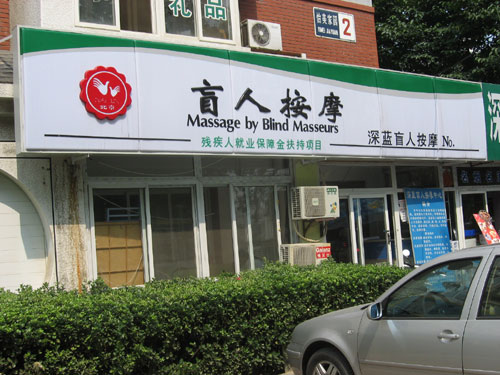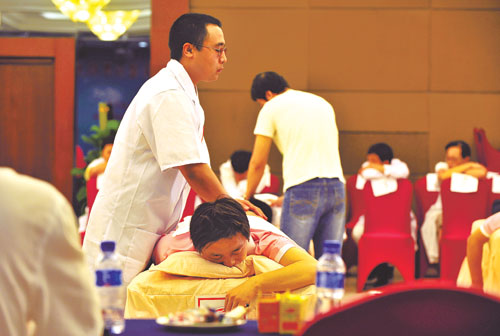Education
Education for blind out of touch in the capital
By Wu Wencong (CHINA DAILY)
Updated: 2010-07-05 10:10
 |
Large Medium Small |
|
 |
|
Massage centers by blind masseurs are highly visible in the capital. PROVIDED TO CHINA DAILY |
The chances of landing any other job than that of a masseur are slim for people with visual impairments in Beijing, but that doesn't stop them dreaming.
"I had always wanted to be a war correspondent before I was blind," said Guo Tao, a masseur in his 20s from the capital who lost his eyesight completely when he was 13.
While he was unable to fulfill that dream, Guo had never thought about offering massages, until it was the first piece of advice from his doctor after Guo became blind.
All five blind masseurs who sat down with METRO, lost their eyesight before the age of 20, they were silent at first when asked about whether they liked their jobs.
"I used to like it when I was at school, but I soon found it could offer me no sense of achievement at all," said Miao Jianyou, who is from Hebei province and who is in his 20s.
Li Weihong, deputy president of the China Association of the Blind, said most people with visual impairment in the job market earn their living from the massage industry.
"About 1,400 people work as registered blind masseuses in Beijing, 500 of whom have the Beijing hukou," said Li.
Guo and Miao said blind people do have an uncommon sense of touch that makes them ideal for the work, but they added that being a masseur was only "a suitable choice as not many alternatives are provided".
But Li said the fact that there are so few alternatives is not so much about choice as it is the lack of educational opportunities for visually impaired people.
"This group of people doesn't have many choices in their career path because they lack options for majors at school," he said.
Almost all registered blind masseuses learned their skills from schools for the blind.
Beijing School for the Blind, the only one in the city and the first in China, has 239 students aged between 6 and 22.
Eighty-one of the 88 high school students have decided to major in massage, which is the only choice of major for the vocational high school students.
"We had thought about setting up a piano tuning major, but the plan was postponed because of the lack of candidates," said Zhang Qiulai, academic designer at the school.
Guo believes the blind should not be restricted to the massage industry.

A blind masseur performs on a customer during a recent massage contest in Beijing. [Bai Jingmeng / for China Daily] |
"I hope other jobs that require proficiency, such as packaging, could also accept people with visual impairment," he said.
"We don't want to be treated as disabled and get constant help from society, what we really want are chances to be engaged completely into the society."
The other four masseurs interviewed agreed.
"I would like to be treated in the same way as others, just normal people who cannot see," said Wang Shihai, a masseur from Jilin province.
Most blind masseurs work long hours for six days a week and, other than during Spring Festival, they rarely leave their place of employment.
Masseurs at Shiyuantang Blind Massage, where Gong Xiaoyan works, each gets five yuan a day for meals.
"Meat is never seen in our staff meal. Look how 'environment-friendly' we are," she joked.
She said giving a massage is hard work, usually a masseur has to put in all of their energy during a one-hour massage.
"It is laborious work," said Wang Jingsong, the boss of Shiyuantang. "But every job has its own hardship."
Wang started the massage center five years ago after quitting his job in IT. He said it was hard to survive in the blind massage industry, even with support from the government.

"Those who want to get into this business who think it's a way to make easy money will be disappointed," he said.
Wang said business costs are high and returns low, because meals and accommodation is provided to the blind masseurs.
"Each massage costs only a little more than 30 yuan with our member card, while the price in beauty salons is between 200 to 300 yuan," Wang told METRO.
"I have kept this center open at a loss for three years."
Many blind masseurs hope that one day, they can open a massage center of their own, instead of working for others.
"I just want to do things within my ability," said Gao Yunlong, a masseur from Hebei province.
"All I ask for is a stable family. I don't want to make big money, a small massage center that is big enough to make a living would be fine."
However, before the end of the interview, Gao said he did have one other dream.
"I really envy journalists," he said. "My ideal job would be to walk around, discovers various things and meet different people everyday."
Li, from China Association of the Blind, said they are making every effort to develop the potential for visual impaired people.
"We are trying to shift the blind massage industry toward medical massage, which requires higher techniques and will avoid impact from beauty salons," he said.
Other professions, such as psychological counselor and telephone operator for customer service centers have also been tried out in Beijing and around the country.
Li said blind people will also be more fully educated in computer skills in the future.
"If we can propagate the use of computers among the blind, they will have many more alternatives," Li told METRO.